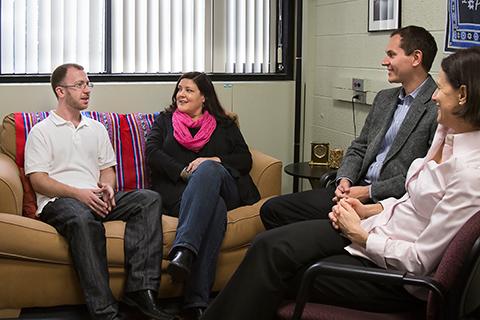Morris ’13M Lands Job in the Field within First Year of Study

By SARAH R. SCHWARTZ ’10
Photography JOSH BLUSTEIN
Most counseling psychology students have to wait till their final year of graduate school to get practical experience in a counseling setting. However, Matt Morris ’13M, a student in Arcadia University’s master’s degree program in Counseling Psychology, completed a 150-hour practicum and landed a part-time job in the field within his first year of study. It was an abrupt transition—going from delivering pizza to help pay his way through school to serving as a residential counselor to people diagnosed with chronic mental illness. But the graduate program’s structure helped Morris find his niche.
During his first semester at Arcadia, Morris chose to do his practicum at Co-Mans, Inc. in Langhorne, Pa., working with a population that, according to the Substance Abuse and Mental Health Services Administration, makes up 20 to 25 percent of the homeless in the United States. He didn’t just shadow a professional. After a few weeks of training, he was helping residents achieve a better quality of life. In the role, which he continues today by working part-time for the organization, Morris helps residents develop skills they’ll need to live independently—cooking, cleaning, budgeting, and more.
Growing up in Philadelphia, Pa., Morris witnessed firsthand the effects of substance abuse and drug dependency, and was always a trusted confidant to classmates. Though these early experiences sparked his curiosity in the field of psychology, leading him to complete a B.A. in both Psychology and English at Temple University, he wasn’t sure about counseling as a profession. He viewed Arcadia’s M.A. in Counseling Psychology as an opportunity to explore his passion for the field, and as a pathway either to practice or to transition into a doctoral program.
He remembers being very nervous when starting out. “[It] was an immediate transition from a passive role to a more active, involved role,” he says, noting that the early practicum is one of the strength’s of Arcadia’s program. “Everyone else at Co-mans came from [a university] where you do your practicum and your internship back-to-back just before graduation. So for them, you’re going to school and you’re learning, but it’s all theoretical, unless you happen to work in the field.”
The experience helped him in his coursework because he was able to see how mental illness plays out in real life. “We talk about it a lot—it’s in books, you see it in the DSM (Diagnostic and Statistical Manual of Mental Disorders), and it makes sense—but when you see the way that an illness plays out in someone’s life, it’s really different.”
In addition to his part-time job at Co-mans, Morris is balancing an internship and scholarly research with a faculty mentor. Morris explains that he would have been happy to accept any internship position. However, he benefited from the advice of his professors, who reminded him: When you’re looking for an internship, you’re interviewing them as much as they’re interviewing you. “I was looking for somebody who was going to give me a broad range of experiences,” Morris says. “I wanted to actually do counseling.”
He found the right fit at Twin Oaks Community Services, a nonprofit based in Mt. Holly, N.J. There, Morris provides traditional therapy for children and families. He’s enjoying the experience so much that he hopes to continue working at Twin Oaks while pursuing state counseling licensure. He would be following in the footsteps of Arcadia alumna and former intern Brittany Baker ’11M, who was hired as a full-time counselor in the summer of 2011.
Though he seems to have found his niche in counseling, Morris says he hasn’t given up on the possibility of pursuing a doctorate in the future—publishing in the field is one of his life goals. His professors, noting his comprehension of selected topics, continue to ask if a doctoral program is something he’s ever considered.
In fact, his mentor Dr. Michael Morrow, Assistant Professor of Psychology, recently asked him to collaborate on a poster presentation. It was an unexpected opportunity. “He emailed me a data set that he thought we might be able to work into a poster for a conference,” he says. “So we met, discussed it, and I did my own follow-up research.” Morris framed the project, contributing the introduction.
The poster, “Parent motivation and attendance in a child behavior therapy clinic,” has been accepted by the 2013 Annual Meeting of the Eastern Psychological Association, which takes in New York City, N.Y., in March 2013.
“The faculty here, you can tell they really care and want you to succeed,” he says. “There’s enough diversity in specialty and personality that you’ll find someone you click with.”

